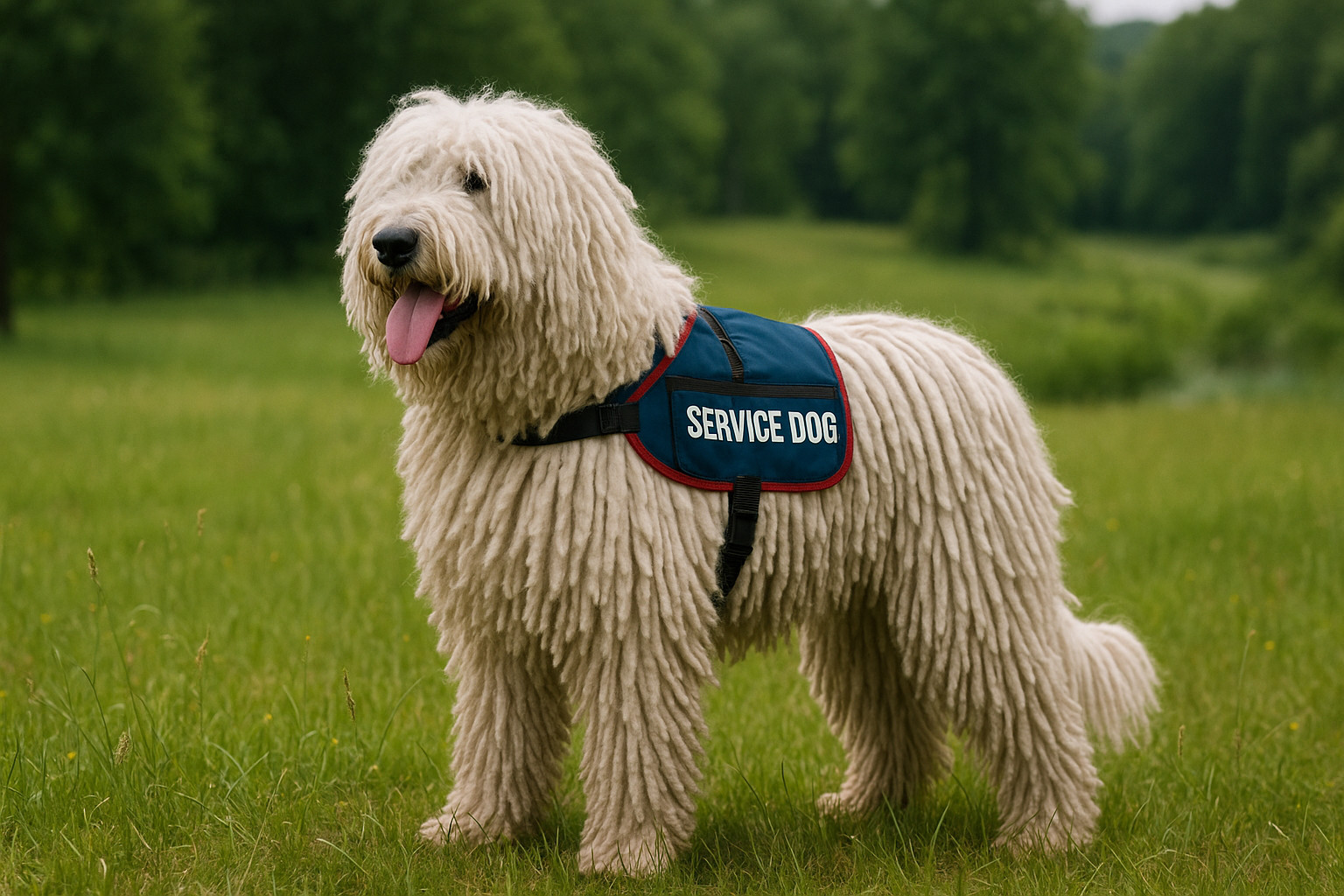Komondor as a Service Dog

Komondor Overview
The Komondor, often referred to as the "Hungarian sheepdog," is a large, muscular breed known for its distinctive corded coat. Originally bred for protecting livestock, the Komondor possesses a blend of loyalty, courage, and intelligence. These attributes make it an intriguing candidate for service dog work. However, their suitability depends on various factors, including their physical characteristics, temperament, and specific health considerations. In this article, we will explore the capabilities of the Komondor as a potential service dog, examining the breed from multiple angles to provide a comprehensive overview.
Physical Characteristics
The Komondor is instantly recognizable due to its massive, cord-like coat, resembling a giant mop. This unique feature, while striking, serves a functional purpose—it provides protection against harsh weather and predator bites.
- Size and Build: The Komondor is a large breed, with males typically weighing between 100-130 pounds and standing 27-30 inches tall, while females are slightly smaller. Their size and strength make them suitable for tasks requiring physical power, such as mobility assistance.
- Coat Characteristics: The dense, corded coat requires significant maintenance. It protects the dog but can be a drawback in hot climates and requires consistent grooming to prevent matting and skin issues.
- Energy and Exercise Needs: Despite their size, Komondors have moderate energy levels. They need regular exercise but are not as hyperactive as some other breeds, which can be beneficial for maintaining focus during service work.
Overall, their physical characteristics can both aid and hinder their roles as service dogs, depending on the environment and specific tasks required.
Temperament and Attitude
The Komondor is known for its protective nature, a trait deeply ingrained from its herding and guarding background. This inherent protectiveness is paired with intelligence and loyalty, making them reliable companions.
- Protective Instincts: While their protective nature is beneficial for guarding and personal safety, it can become problematic in public settings where the dog might perceive a threat where there is none, necessitating careful socialization and training.
- Trainability and Intelligence: Komondors are intelligent but also independent, often displaying a stubborn streak. This can make training challenging, requiring a patient and experienced handler.
- Behavior in Stressful Environments: Their calm demeanor at home may not always translate to busy public environments. Proper socialization from a young age is essential to ensure they remain composed and focused on their tasks.
Komondors can excel as service dogs if their guardians work diligently to harness their strengths while addressing potential behavioral challenges.
Types of Service Work
Given their unique characteristics, Komondors are suited for certain types of service work over others. Their suitability is primarily influenced by their physical capabilities and temperament.
- Mobility Assistance: The breed's strength and size make them excellent candidates for mobility assistance roles. They can support walking, pull wheelchairs, or retrieve objects for individuals with physical disabilities.
- Protection and Support: Their natural guarding ability means they can be trained to alert their handlers to potential threats or intruders, though this must be carefully managed with consistent training.
- Emotional Support and PTSD: Their calm and loyal nature can provide emotional support, especially for individuals with PTSD or anxiety disorders. However, their aloofness with strangers might limit their efficacy in highly social or interactive therapeutic settings.
While they may not be the top choice for all types of service work, Komondors excel in roles that utilize their physical strength and protective instincts, benefiting individuals with specific needs.
Health Considerations
Health is an essential factor when considering any breed for service work. Komondors, like all purebred dogs, have certain health issues to be mindful of.
- Hip Dysplasia: This common issue in large breeds can limit their ability to perform certain tasks, requiring careful selection and health screening from reputable breeders.
- Skin and Coat Care: Their corded coat can trap dirt and moisture, leading to skin infections if not properly maintained. Regular grooming and inspections are crucial.
- Bloat: Large, deep-chested breeds are at risk for bloat, a life-threatening condition that requires immediate veterinary intervention. Owners must be vigilant about their feeding habits.
These health considerations mean that prospective service Komondors require regular veterinary check-ups and a knowledgeable handler to manage potential issues.
Training and Suitability
Training a Komondor as a service dog requires dedication and expertise. Their independent nature can be a hurdle, but with the right approach, they can excel.
- Training Approach: Positive reinforcement methods, coupled with patience and consistency, are key to successful training. The breed’s intelligence facilitates learning but may also mean they challenge boundaries if not well-managed.
- Socialization: Early and consistent socialization is crucial to ensure they remain adaptable to various environments and people. Exposure to different settings can mitigate their wariness of strangers and reduce protectiveness.
- Handler Compatibility: Komondors are best suited to handlers with some experience with large, independent breeds. Collaboration with professional trainers familiar with their unique traits can enhance training efficacy.
In summary, while training a Komondor for service dog roles can be challenging due to their unique characteristics, it is manageable with experience and a tailored approach.
Summary of Komondor
The Komondor possesses several qualities that can make it a valuable service dog, yet it also presents challenges related to its size, temperament, and health requirements. Here’s a summary of key strengths, weaknesses, and suitable service roles:
Strengths:
- Strong physical build suitable for mobility assistance
- Deep loyalty and protective instincts
- Moderate energy level conducive to focused work
Weaknesses:
- Independent and sometimes stubborn during training
- Challenging coat maintenance
- Health risks such as hip dysplasia and bloat
Suitable Service Roles:
- Mobility assistance
- Guarding-oriented roles requiring protective instincts
- Emotional support in low-stress environments
In conclusion, the Komondor can thrive as a service dog in roles that leverage its natural talents and adapt to its health and behavioral nuances. The breed requires dedicated owners willing to invest in specialized training and care.











